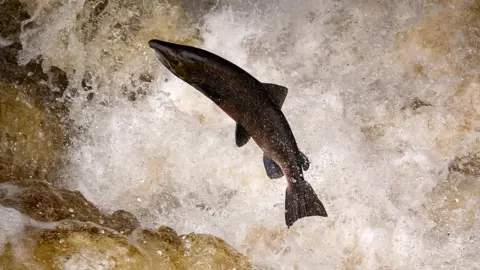Salmon stocks in England and Wales reaching crisis point, report warns
 Getty Images
Getty ImagesWild Atlantic salmon stocks in England and Wales are at their lowest levels on record and are reaching crisis point, according to the Environment Agency.
Many factors such as climate change and overfishing are impacting salmon numbers globally.
In the latest EA survey 74% of salmon rivers are thought to be "at risk" - meaning salmon numbers are not at sustainable levels.
Only one river in England, the River Tyne, is in the 'not at risk" category.
Rivers in the South West, North West and Wales are the most affected.
Kevin Austin, deputy director for agriculture, fisheries and the natural environment for the Environment Agency said: "Today's assessment for England is of great concern and without urgent action wild Atlantic salmon could be lost from our rivers in our lifetimes.
"We have seen some real successes through our work with partners, particularly on the river Don and Tyne, but more much progress is needed.
"As the climate emergency becomes more acute, we need coordinated action between governments, partners and industry to enable stocks to stabilise and recover to sustainable levels."
In its annual survey of water quality, the Environment Agency called for tougher fines and prison sentences for those responsible for serious and deliberate pollution affecting water quality.
The Environment Agency and its partners are attempting to ease the pressures that affect the different life stages of salmon.
The priorities are:
- Improve marine survival
- Further reduce exploitation by nets and rods
- Remove barriers to migration and enhance habitat
- Safeguard sufficient flows
- Maximise spawning success by improving water quality
Work is also taking place to improve water quality and reduce the exploitation of salmon by both net and rod fisheries.
The Scottish government has described their salmon population as being at "crisis point" and have put £500,000 of funding to support wild salmon conservation measures.
Reported rod catching of salmon is the lowest since records began, and 75% of the previous five-year average according to the Scottish government.